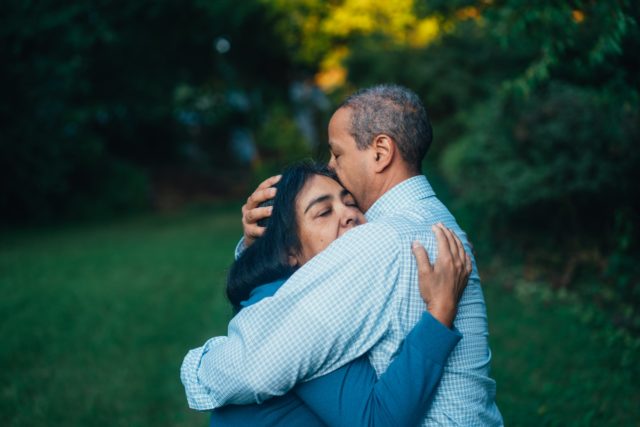How to Apologize in Three Steps
By: Rochelle Perper, Ph.D. | April 7, 2023

Saying “I’m sorry” is an effective way to build trust in relationships and is important for emotional closeness. A good apology reduces stress, creates a new perspective, and gives us a chance to learn something new about ourselves and others. We are all susceptible to saying something unkind, lashing out in anger, or being careless or insensitive in our actions, especially when under stress. The mistakes themselves aren’t nearly as impactful as how we choose to handle them afterwards.
The Truth about Apologies
Despite the benefits, apologies aren’t easy. Some people think that saying “I’m sorry” makes them weak or implies that something is wrong with them. To the contrary: The opposite is true! Apologizing shows a great deal of strength and courage because it’s hard to admit when we are wrong.
Here are a few other things you might not know about apologies:
-
- Saying “I’m sorry” does not mean that you are all wrong and the other person is all right
- It’s important to apologize even if you think that what you did or said wasn’t all that bad, or if you believe that the other person is in the wrong
- Saying sorry shows that you care about the other person when you’ve hurt someone by accident or had no way of knowing that your actions would cause harm
- Acknowledging mistakes requires vulnerability, which is a key ingredient for intimacy; as such, a good apology brings people closer together
Three Steps to a Good Apology
A good apology needs to be genuine to be effective. An insufficient or insincere apology can do more damage than no apology at all. Follow the three steps below to create a meaningful and effective apology:
1. Take responsibility for your part
A good apology must include an acknowledgement of the mistake you made in clear and specific terms. It’s not enough to simply say “I’m sorry” and leave it at that. Take responsibility for your actions; demonstrate genuine thoughtfulness and reflection. Make it clear that your behavior was unacceptable and don’t make excuses or justify your decision. Remember, it is just as important to apologize and express regret when you have unintentionally hurt someone’s feelings or if you had no way of knowing that your actions would cause harm.
Saying sorry doesn’t mean that you are 100% wrong. Rather, it means that you value your relationships more than your ego.
Pro tip: Saying “I didn’t mean it” feels like you are avoiding responsibility or making an excuse. Instead, say something that communicates to the other person that you understand that you made a mistake. For example, say “I see that my comment hurt you,” or “Now I know the importance of giving you space.”
2. Acknowledge the impact of your actions
A good apology validates the other person’s experience by acknowledging the impact of your actions. Emotional impact occurs when the other person feels offended, hurt, intimidated, embarrassed, worried, overlooked, ignored, or left out. In some cases, the impact of your actions feels more tangible. For example, your mistake might cause someone some extra inconvenience or work; it might damage someone’s reputation or relationships with others, cost money and time, or result in a missed opportunity. Never dismiss or minimize another person’s reactions or question their hurt.
To truly understand the impact of your actions, listen carefully to the other person without interrupting, making excuses, or defending yourself.
Pro tip: Saying “I’m sorry you feel that way” feels dismissive and invalidating because the language is too vague and passive. A good apology occurs when you specifically identify the impact it has had on the other person, so they feel seen and heard.
3. Make a repair attempt
A good apology includes some type of agreement that you will take steps to change and avoid the mistake happening again. This stands as an integral but often overlooked part of a good apology because it shows that you are not just sorry for what happened, but you care about the person enough to ensure the mistake doesn’t happen again. A repair attempt can range from saying “I am going to keep this in mind and try to be more sensitive in the future” to offering to repair or replace someone’s property if you have damaged it.
Pro tip: As tempting as it may be, avoid saying “I promise I’ll never do that again” because it is too aspirational. Breaking promises – even when they are sincerely made – works against trust building. Instead, be realistic about your capabilities.
Examples of repair attempts:
-
- Set reminders for yourself if you forgot something
- Offer a “re-do” if you missed the mark the first time
- Provide assistance if your actions caused inconvenience
- Give the person a genuine compliment if you’ve hurt their feelings
- Validate their experience if they felt misunderstood
- Promise to explore more deeply any underlying biases, misperceptions and misconceptions that you may have
When we make a good apology, we can re-establish connection and regain trust with others. Yet, saying “I’m sorry” is hard, as it can be challenging to admit when you have done something wrong. Apologizing is a sign of emotional maturity and is a skill like any other.
Apologizing well takes practice and a great deal of introspection.
The team at Therapy Changes provides focused guidance when you need it most – when going it alone feels overwhelming and hopeless. Together, you and your San Diego Psychologist will develop strategies to create meaningful relationships, live life in-line with your values, and be a healthier version of yourself. Contact Us today to learn more about how therapy can help, and to schedule an appointment.
Photo by Gus Moretta on Unsplash



